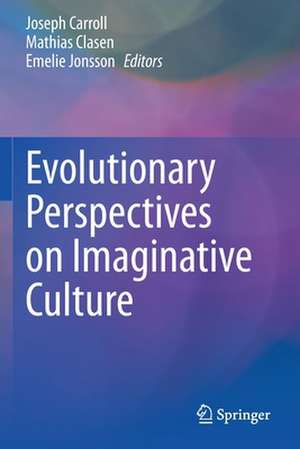Evolutionary Perspectives on Imaginative Culture
Editat de Joseph Carroll, Mathias Clasen, Emelie Jonssonen Limba Engleză Paperback – 28 aug 2021
- Imagination: Evolution, Mechanisms and Functions
- Myth and Religion
- Aesthetic Theory
- Music
- Visual and Plastic Arts
- Video Games and Films
- Oral Narratives and Literature
The chapters “Imagination, the Brain’s Default Mode Network, and Imaginative Verbal Artifacts” and “The Role of Aesthetic Style in Alleviating Anxiety About the Future” are licensed under the terms of the Creative Commons Attribution 4.0 International License (http://creativecommons.org/licenses/by/4.0/).
| Toate formatele și edițiile | Preț | Express |
|---|---|---|
| Paperback (1) | 896.70 lei 6-8 săpt. | |
| Springer International Publishing – 28 aug 2021 | 896.70 lei 6-8 săpt. | |
| Hardback (1) | 902.86 lei 6-8 săpt. | |
| Springer International Publishing – 28 aug 2020 | 902.86 lei 6-8 săpt. |
Preț: 896.70 lei
Preț vechi: 1093.53 lei
-18% Nou
Puncte Express: 1345
Preț estimativ în valută:
171.59€ • 179.75$ • 142.21£
171.59€ • 179.75$ • 142.21£
Carte tipărită la comandă
Livrare economică 09-23 aprilie
Preluare comenzi: 021 569.72.76
Specificații
ISBN-13: 9783030461928
ISBN-10: 3030461920
Ilustrații: XI, 423 p. 12 illus.
Dimensiuni: 155 x 235 mm
Greutate: 0.61 kg
Ediția:1st ed. 2020
Editura: Springer International Publishing
Colecția Springer
Locul publicării:Cham, Switzerland
ISBN-10: 3030461920
Ilustrații: XI, 423 p. 12 illus.
Dimensiuni: 155 x 235 mm
Greutate: 0.61 kg
Ediția:1st ed. 2020
Editura: Springer International Publishing
Colecția Springer
Locul publicării:Cham, Switzerland
Cuprins
Part I: The Evolution of Imagination.- The Behaviorally Modern Human Imagination.- The Evolution of Imagination through Narratives and Belief.- Part II: Meta-Narratives.- Imagining the Gods.- The Evolution of Traits and Stories: Two Rival Templates for Self-Understanding.- Descent with Imagination: The Cultural Evolution of Traditional Narratives.- The Unimaginable Place in Nature: Literary Resistance to Darwinian Evolution.- Epic Communities and Cosmic Apprenticeship: Group-Belonging and Social Learning in Popular Science Books.- Part III: Aesthetics, Music, and the Plastic Arts.- Tapping the Imagination at the Dawn of Human Culture: Art, Brain and Evolutionary Pressures.- Evolutionary Constraints on Creativity in the Visual and Plastic Arts.- The Role of Aesthetic Style in Framing Cognitive Orientation Towards the Future.- The Evolution of Music: A Paradigm of Embodied Cognition.- The Influence of Image Salience on Artistic Expression: Cross-Cultural Examples of Large Felid Predators.- Key Stimuli and Power Objects: Aesthetics and Humans’ Inborn Sensibilities.- Part IV: Film, Media, and Performance.- Film and Coevolution: Kubrick’s Movies as Modes of Religious Ritual.- Why Women Love Bromance: The Rise of Slash Fiction.- “Unbreakable, Incorruptible, Unyielding”: Doom as an Agency Simulator.- Part V: Literature.- Adaptive Flights of Fancy: An Evolutionary Perspective on Speculative Fiction.- Narrative and Verse—and Comics.- Literary Representations of Parental Investment: Emotional Quandaries and Strategic Decisions.
Notă biografică
Joseph Carroll is Curators’ Distinguished Professor in the English department at the University of Missouri, St. Louis. Since the early 1990s, he has been working to integrate evolutionary research and literary study. He has developed an evolutionary theory of literature, produced interpretive essays on literary works ranging from plays of Shakespeare to modern novels, written essays in intellectual history, and conducted empirical research on protagonists and antagonists in Victorian fiction.
Mathias Clasen is associate professor in literature and media in the English Department, Aarhus University, and associate editor of Evolutionary Studies in Imaginative Culture. His research focuses on horror entertainment from an evolutionary perspective. His book Why Horror Seduces was published by Oxford University Press in 2017.
Emelie Jonsson is assistant professor of English literature at the University of Tromsø, Norway. Her research centers on the friction between human psychology and naturalistic cosmology. She has published evolutionary interpretive arguments on E. M. Forster, H. G. Wells, Arthur Conan Doyle, T. H. Huxley, and Edward Bulwer Lytton, as well as collaborated on quantitative projects concerning intellectual history, biocultural theory, and poetic archetypes reflecting mating strategies. She is an associate editor of Evolutionary Studies in Imaginative Culture.
Mathias Clasen is associate professor in literature and media in the English Department, Aarhus University, and associate editor of Evolutionary Studies in Imaginative Culture. His research focuses on horror entertainment from an evolutionary perspective. His book Why Horror Seduces was published by Oxford University Press in 2017.
Emelie Jonsson is assistant professor of English literature at the University of Tromsø, Norway. Her research centers on the friction between human psychology and naturalistic cosmology. She has published evolutionary interpretive arguments on E. M. Forster, H. G. Wells, Arthur Conan Doyle, T. H. Huxley, and Edward Bulwer Lytton, as well as collaborated on quantitative projects concerning intellectual history, biocultural theory, and poetic archetypes reflecting mating strategies. She is an associate editor of Evolutionary Studies in Imaginative Culture.
Textul de pe ultima copertă
The chapters “Imagination, the Brain’s Default Mode Network, and Imaginative Verbal Artifacts” and “The Role of Aesthetic Style in Alleviating Anxiety About the Future” are licensed under the terms of the Creative Commons Attribution 4.0 International License (http://creativecommons.org/licenses/by/4.0/).
Caracteristici
Multidisciplinary overview of the emergent field of imaginative culture
Noted experts advance understanding of the evolution of shared mental life
Extends concepts of social psychology, personality psychology, and evolutionary psychology
Noted experts advance understanding of the evolution of shared mental life
Extends concepts of social psychology, personality psychology, and evolutionary psychology
